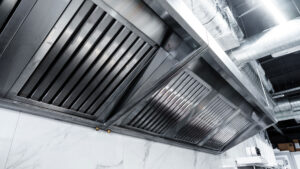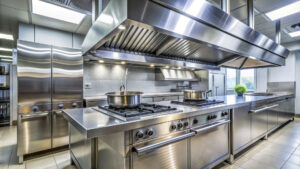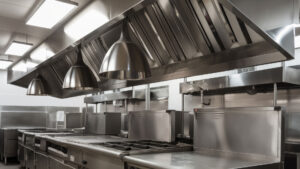Commercial kitchen exhaust systems play a vital but often overlooked role in kitchen safety. Today, let’s dive into the crucial topic of cleaning schedules and why they matter so much for your restaurant’s wellbeing.
The Simple Answer: It Depends on Your Cooking Volume
While many kitchen operators want a straightforward answer, the cleaning frequency for your exhaust system actually varies based on how much cooking you do. Think of it like changing the oil in your car – the more you drive, the more frequently you need to change it. The National Fire Protection Association (NFPA) has established guidelines based on cooking volume:
For solid fuel cooking operations (like wood or charcoal grills): Monthly cleaning is mandatory. These systems accumulate grease rapidly, which is highly flammable and needs frequent removal.
For high-volume operations (operating 12-16 hours per day): Quarterly cleaning is the minimum requirement. This includes most busy restaurants, especially those doing lots of frying or grilling.
For moderate-volume operations (operating 6-12 hours per day): Semi-annual cleaning might be sufficient. This often applies to smaller restaurants or those with lighter cooking loads.
For low-volume operations (like seasonal businesses or churches): Annual cleaning may be adequate, though more frequent inspections are still recommended.
Understanding the Science Behind the Schedule
To appreciate why these schedules matter, let’s understand what happens inside your exhaust system. When you cook, especially with oil or fat, tiny particles become airborne and travel up through your hood. As the air cools in the ductwork, these particles condense and stick to the surfaces. Over time, this buildup becomes thicker and more dangerous.
This accumulated grease is not just unsanitary – it’s a serious fire hazard. If the grease layer reaches 1/8 inch (about 3mm) thickness, it’s considered a significant fire risk. A fire starting on your cooking surface could easily ignite this grease, turning your exhaust system into a chimney of fire that’s extremely difficult for firefighters to access and extinguish.
Signs You Need Immediate Cleaning
Don’t just rely on the calendar – watch for these warning signs that indicate your system needs immediate attention:
Visible grease dripping from hood seams or filters
Excessive smoke or strong odors in the kitchen
Sluggish air flow or ventilation problems
Strange noises from the exhaust fan
Visible grease accumulation on roof areas around exhaust outlets
The Impact of Modern Cooking Trends
If your kitchen has recently changed its menu or cooking methods, you might need to adjust your cleaning schedule. For instance, adding a char-broiler or wok station significantly increases grease production. Similarly, switching to vegetable oils might seem cleaner, but these oils actually vaporize at lower temperatures, potentially leading to more airborne grease.
Beyond Regular Cleaning: A Complete Maintenance Approach
While professional cleaning is essential, daily maintenance practices can help extend the time between deep cleanings and improve overall system performance. Train your staff to:
Clean hood filters daily or weekly, depending on use
Wipe down visible hood surfaces regularly
Monitor and report any changes in system performance
Keep cleaning records and inspection certificates
The Cost of Neglect
Some operators try to extend the time between cleanings to save money, but this approach often backfires. A dirty exhaust system:
Works less efficiently, increasing energy costs
Creates fire hazards that could void insurance coverage
May lead to health code violations and fines
Risks catastrophic fire damage to your business
Looking Ahead: Modern Solutions
New technologies are emerging to help manage exhaust system cleanliness. Some systems now include monitoring devices that measure grease buildup, while others use UV light or water-wash systems to reduce accumulation. While these innovations can help, they don’t eliminate the need for regular professional cleaning.
Remember, maintaining a clean exhaust system isn’t just about following regulations – it’s about protecting your investment, your employees, and your customers. When in doubt, consult with a certified kitchen exhaust cleaner who can evaluate your specific needs and recommend an appropriate cleaning schedule.
By understanding and following proper cleaning schedules, you’re not just maintaining equipment – you’re investing in your business’s safety and longevity. What steps will you take today to ensure your kitchen exhaust system is getting the attention it needs?



